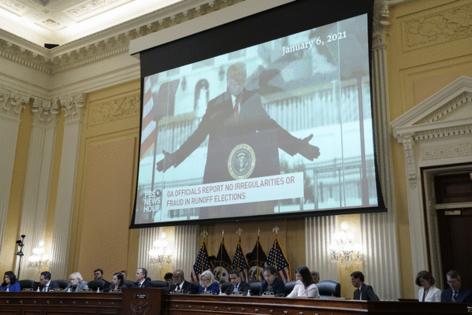Trump says he will look at pardons for Jan. 6 attackers on 'first day'
Published in Political News
WASHINGTON — President-elect Donald Trump reiterated plans in an interview that aired Sunday to pardon those who attacked the Capitol on Jan. 6, 2021, as well as his desire to see members of the House select panel that investigated that attack put in jail.
Trump, during an interview with “Meet the Press,” said he is “going to be acting very quickly, first day” to look at pardons for those who attacked the Capitol and disrupted the counting of electoral votes, Trump said.
The comments were some of Trump’s first on pardons following his victory in the 2024 campaign, where he spent months promising retribution against his political foes, repeating false claims about the 2020 election and promising to dole out pardons to Jan. 6 attackers.
Rogers Smith, a political science professor at the University of Pennsylvania, said the actions are likely within Trump’s constitutional power to pardon defendants of federal crimes, but it could “provoke still deeper political divisions across the country.”
“The pardons will likely reinforce the views of many millions of Americans who believe the 2020 election was stolen from Donald Trump and view the insurrection as a patriotic act designed to overturn a corrupt election outcome,” Smith said.
“At the same time, the majority of Americans don’t believe the 2020 election was stolen and they see the invasion of the Capitol as actions of lawless violence,” Smith said.
Smith said the pardons could also serve as an argument for participants in the attack to be able to serve in political office in the future. Smith said that although a Supreme Court decision earlier this year held that states could not keep insurrectionists from running for federal office, several states have prevented defendants from running for state office.
According to the Justice Department, more than 1,500 people have been charged in connection with the attack and hundreds have been convicted of or pleaded guilty to crimes. That includes 18 charged with seditious conspiracy and more than 100 charged with using a deadly or dangerous weapon or seriously injuring a police officer.
Another more than 500 defendants were charged with assaulting or otherwise interfering with police as they tried to secure the Capitol, the DOJ’s latest update said.
Trump on “Meet the Press” clarified that there would be “some exceptions” to his pardons if defendants acted “radical” during the attack, which injured more than 100 police officers.
“I’m going to look at everything. We’re going to look at individual cases,” Trump said.
Numerous defendants in Washington have sought to delay their cases citing Trump’s victory, including William Pope, a defendant who represented himself, and in a filing last month criticized continuing the case as a “belligerent disregard” for the will of American voters.
Judge Rudolph Contreras granted a delay in Pope’s trial, which was meant to start last week. A new trial date has not yet been set.
Trump’s comments came after a campaign where he vowed retribution on his political enemies and threatened prosecutors who pursued civil and criminal cases against him.
Committee members
Regarding the House select committee that investigated the Jan. 6, 2021, attack, Trump alleged without evidence that Republican former Rep. Liz Cheney, R-Wyo., and other members of the panel lied and destroyed evidence. He called the members “political thugs and you know, creeps.” He said “they should go to jail.”
“They deleted and destroyed a whole year and a half worth of testimony,” Trump said. “Do you know that I can’t get — I think those people committed a major crime.”
When asked if he would direct the FBI and Justice Department to send them to jail, Trump replied that they can do what they want. “No, not at all. I think that they’ll have to look at that, but I’m not going to — I’m going to focus on drill, baby, drill,” Trump said.
Following the interview, Cheney defended the work she and others did on the panel, calling Trump’s threat an “assault on the rule of law” in a social media post.
While previously Trump has said that prosecutors who pursued charges against him should themselves face criminal cases, he said Sunday that he would not order his attorney general pick, Pam Bondi, to pursue a case against Special Counsel John L. “Jack” Smith.
Trump previously said he would fire the special counsel and wanted to have him deported, though he is an American citizen.
Frank Bowman, a law professor at University of Missouri and former federal prosecutor, said such mass pardons had occurred in the past, including for former confederates after the Civil War and former draft dodgers after Vietnam. However, the fact that Capitol rioters effectively acted as Trump’s allies would make the pardons stick out in history.
“Would a pardon of a fairly large group of insurrectionists either named or unnamed be unprecedented in U.S. history? No. Would pardoning people who were effectively your co-conspirators? Yes, completely unique,” Bowman said.
Trump’s allies in Congress have pushed him to issue blanket pardons to Jan. 6 attackers, including Rep. Marjorie Taylor Greene, R-Ga., who referred to the federal jail in Washington as a “gulag” and called them political prisoners in social media posts.
_____
©2024 CQ-Roll Call, Inc., All Rights Reserved. Visit cqrollcall.com. Distributed by Tribune Content Agency, LLC.




























































Comments